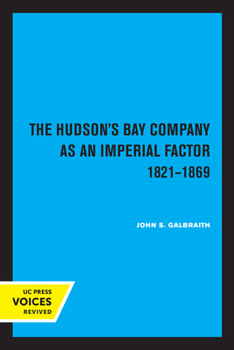The Hudson's Bay Company as an Imperial Factor, 1821-1869
Select Format
Select Condition 
Book Overview
The Hudson's Bay Company as an Imperial Factor: 1821-1869 explores the rise, consolidation, and eventual decline of the Hudson's Bay Company's fur trade monopoly in British North America. Beginning in 1821, with the company's amalgamation with the North West Company, and ending in 1869 with the sale of its proprietary rights in Rupert's Land to Canada, the book examines the company's transition from a dominant fur-trading enterprise to an organization unable to sustain its monopoly amidst increasing settlement pressures. The study delves into the company's strategies along trade frontiers, its adaptations to changing societal dynamics, and its ultimate acceptance of the inevitable shift from a fur-trade economy to settlement-driven development. The narrative also highlights the Hudson's Bay Company's complex role in the international relations of Great Britain, Russia, the United States, and Canada. It details the company's influence on diplomatic negotiations, acting at times as a key force or an obstacle to national agendas. By analyzing the company's policies and their broader implications, the book provides a detailed account of its significant yet challenging position as both an economic and political entity during a transformative period in North American history. This title is part of UC Press's Voices Revived program, which commemorates University of California Press's mission to seek out and cultivate the brightest minds and give them voice, reach, and impact. Drawing on a backlist dating to 1893, Voices Revived makes high-quality, peer-reviewed scholarship accessible once again using print-on-demand technology. This title was originally published in 1957.
Format:Paperback
Language:English
ISBN:0520322703
ISBN13:9780520322707
Release Date:July 2022
Publisher:University of California Press
Length:510 Pages
Weight:1.72 lbs.
Dimensions:1.1" x 6.1" x 9.2"
Customer Reviews
0 rating





